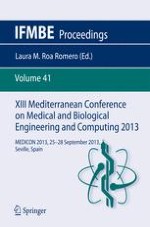2014 | OriginalPaper | Buchkapitel
Computer Aided Decision Support Tool for Rectal Cancer TNM Staging Using MRI
verfasst von : A. Torrado-Carvajal, T. Martin Fernandez-Gallardo, N. Malpica
Erschienen in: XIII Mediterranean Conference on Medical and Biological Engineering and Computing 2013
Aktivieren Sie unsere intelligente Suche, um passende Fachinhalte oder Patente zu finden.
Wählen Sie Textabschnitte aus um mit Künstlicher Intelligenz passenden Patente zu finden. powered by
Markieren Sie Textabschnitte, um KI-gestützt weitere passende Inhalte zu finden. powered by
Rectal cancer (RC) is associated with a poor prognosis because of the risk both for metastases and for local recurrence after total mesorectal excision (TME) surgery. Preoperative assessment (cTNM) for neoadjuvant therapy (radiation therapy and/or chemotherapy) is very important to minimize recurrence rates. Therefore, the challenge for preoperative imaging in RC is to determine the different risk of recurrence in different patients.
TME has changed several strategies for treatment in RC patients in developed countries. Additionally the introduction of national training programs, such as the “Audited teaching program for the treatment of rectal cancer in Spain” (Viking Project), have decreased local recurrence and mortality rates and while increased survival.
These programs aim at assessing TME including an evaluation of the use of MRI for preoperative assessment. This situation explains the increasing interest in computer aided diagnosis (CAD) tools for this pathology. However, MRI processing in RC is notoriously difficult due to the uncertainty of signal intensity changes along the mesorectal fascia and the different criteria used to predict nodal involvement.
This paper presents a complete computer aided decision support tool for rectal cancer TNM staging following the “Viking Project” recommendations. We have applied image processing to extract and quantify the extension of the primary tumor (T staging) as well as to characterize and classify the lymph nodes to predict nodal involvement (N staging).
Our tool includes tools for: (1) segmentation of the main structures of the mesorectum (lumen, primary tumor and mesorectal fascia) for T staging, (2) segmentation, feature extraction, and classification of the local lymph nodes for N staging, (3) 3D rendering of the segmented structures for surgery planning, and (4) automatic report generation.
Accuracy of the results has been assessed with an expert radiologist. Remaining image processing challenges are indicated and some directions for future research are given.
